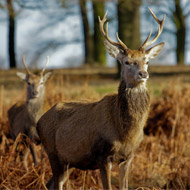
Charity releases evidence that hunters are being sent to kill red stag
An animal charity claims Woburn Abbey Deer Park should be ‘asked tough questions’ regarding the killing of their deer by trophy hunters.
The League Against Cruel Sports released evidence with Bedfordshire Against Trophy Hunting (BATH) that hunters were being sent to the park, which is owned by the same company as Woburn Safari Park.
In a statement released to The Observer, Woburn Safari Park said the deer were being killed as part of an ‘annual cull’.
“Breeding deer with giant antlers so they can be shot for money by hunters for ‘fun’ is something that most members of the public will find grotesque,” said Chris Luffingham, director of campaigns at LACS. “The culling argument doesn’t stack up. They breed the deer – so if there’s too many, stop breeding them, it’s that simple.”
The link with Woburn was discovered after BATH contacted the tour company, Limpopo Diana Hunting Tours. The company’s sales director confirmed details of the deer being shot, adding that ‘Woburn Park is ideal for this and we can do Pere David and red stag as well.’
Chris Luffingham continued: “Woburn say they are not associated with Limpopo Diana Hunting Tours, which offers these hunting packages – but they don’t deny outright that they allow trophy hunters to kill their deer,” said Chris Luffingham.
“Anyone who loves animals, including those they see at the Safari Park, should ask them some tough questions: do you raise money by allowing trophy hunters to kill your deer?
“It’s shameful that trophy hunting is alive and well in Britain. Killing animals for fun and posing with the corpse of their victim is a vile and sickening activity which has no place in a modern and compassionate society.”
A spokesperson from Bedfordshire Against Trophy Hunting, said: “We were horrified to discover trophy hunting was taking place in our own backyard and being marketed internationally on the novelty of being able to shoot 'rare and exotic' deer breeds.
“Woburn Abbey Deer Park breeds red stags with world record standard trophy antlers – some of these poor beasts are then shot in exchange for thousands of pounds each.
“This is the same deer park that proudly trumpets what it has done to save the Père David breed from extinction but now allows hunters to shoot them.”



 The latest
The latest